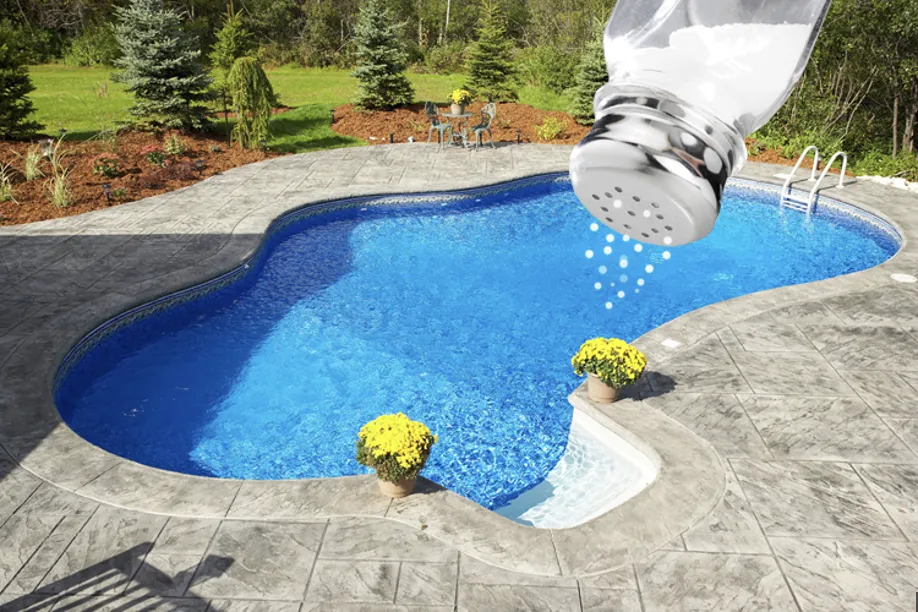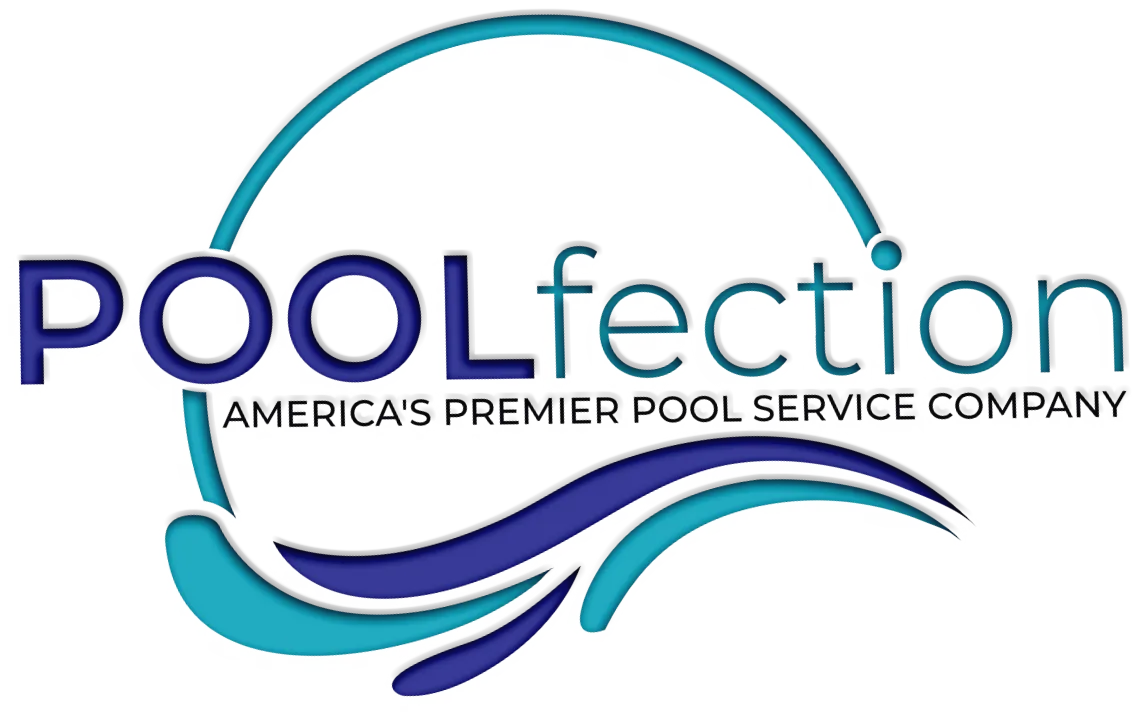Serving Pasco County, Spring Hill Area, New Tampa, and Surrounding areas | 1-833-519-POOL (7665)

Quality Care For Your
Backyard Oasis
Let the pool maintenance experts
handle your home oasis from A-Z
At Poolfection, we know your residential pool is a treasured backyard escape for you and your family. Our residential services are designed to maintain your pool's beauty and safety without hassle. We provide customized weekly or monthly cleanings using eco-friendly chemicals to keep water pristine. Our technicians also open and close pools seasonally and provide incidental service like pump repairs. Contact us today to learn more about our full residential packages!

Does My Salt Pool Have Chlorine in It
Does My Salt Pool Have Chlorine in It?

Swimming pools are a fantastic way to unwind, offering refreshing relief during the scorching summer months. If you own a saltwater pool, you might have come across a common misconception that these types of pools do not contain any chlorine.
However, let's delve deeper into this topic to debunk this myth and gain a comprehensive understanding of how saltwater pools function. By exploring the intricate mechanisms of saltwater pools, we can appreciate the unique benefits they offer and how they contribute to a more enjoyable swimming experience.
So, let's dive in and see if the salt pool contains chlorine or not.
The Chemistry Behind Saltwater Pools
Understanding Sodium Chloride (Salt)
Saltwater pools use sodium chloride (salt) as a primary ingredient. Sodium chloride is a compound consisting of two elements: sodium (Na) and chlorine (Cl). When dissolved in water, it separates into these two components.
Electrolysis Process
Saltwater pools use a special device called a chlorine generator or salt cell to convert salt into chlorine. This process is known as electrolysis. During electrolysis, salt water is passed through the generator, which applies an electrical charge. This charge breaks down the sodium chloride into hypochlorous acid and sodium hypochlorite, both of which are effective sanitizers.
Does My Salt Pool Have Chlorine in It? YES!
So, to answer the question: yes, your saltwater pool does contain chlorine. However, it's important to note that the chlorine in a saltwater pool is different from traditional chlorine pools because of how it's produced. The electrolysis process ensures that the chlorine is more efficiently released into the water while also making it easier for your eyes and skin to tolerate.
In addition, the chlorine produced through electrolysis has a longer lifespan than traditional chlorine pools, which minimizes the need for frequent maintenance and additional additives such as stabilizers or algaecides. This makes saltwater pools an ideal choice for busy pool owners who want to enjoy their swimming experience without worrying about time-consuming upkeep.
Benefits of Chlorine in Saltwater Pools
Gentle on Your Body and Clothing
Firstly, saltwater pools are gentler on your body and clothing. Traditional chlorine can be harsh on the skin and eyes and can even fade swimsuits over time. However, the chlorine produced in saltwater pools is typically less concentrated and, therefore, less irritating.
Promotes Healthy Breathing and Reduces Allergy Issues
Saltwater pools offer an additional advantage by promoting better respiratory health and reducing allergy concerns. The lower chlorine levels in these pools minimize the risk of respiratory issues and skin allergies that individuals may encounter with traditional chlorine pools.
Provides a Soft, Silky Water Feel
Many people also report that the water in saltwater pools feels softer and silkier compared to traditional chlorine pools. This is because saltwater pools use a natural electrolysis process that generates chlorine from salt, resulting in a gentler and more pleasant swimming experience. The slightly elevated salt content in the water creates a soothing effect on the skin, making it feel smoother and more luxurious. So, not only can you enjoy a dip in a saltwater pool, but you can also indulge in a truly pampering and indulgent swimming experience.
Myths Of Saltwater Pools
Saltwater Is Better Than Chlorine Water
While there is an ongoing debate about whether saltwater is superior for the skin, the choice between saltwater and traditional chlorine pools ultimately depends on personal preference. According to a household survey, certain individuals reported more manageable hair after swimming in a saltwater pool treated with chlorine.
Before deciding on the type of pool to install in your backyard, it's worth experiencing both saltwater and traditional pools firsthand. This will help you determine your personal preference and make an informed choice. So go ahead, take the plunge, and find the perfect pool for your oasis.
Saltwater Pools Are Chlorine Free
Contrary to what many people think, saltwater pools aren't completely chlorine-free. These pools use chlorine generators and an electrolysis process to create the necessary chlorine. So, when electricity passes through saltwater, it reacts with chloride ions in the salt, producing chlorine and a byproduct called sodium hydroxide, which has a high pH. In other words, the idea of a chlorine-free pool is just a myth and a bit of a joke in the pool industry.
Saltwater Pools Are Salty
Saltwater pools are often thought to have excessively salty water. In reality, the salt concentration in saltwater pools is approximately 2500 parts per million (ppm), significantly lower than the 35,000 ppm found in ocean water. This lower concentration ensures that the water does not dehydrate the body, resulting in a more pleasant swimming experience than one might assume.
There Is No Need For Extra Chemicals
While some individuals may assume that saltwater pools do not require extra chemicals for upkeep because of their chlorine generators, this is not entirely accurate. Maintaining the salinity and overall balance of the water necessitates the use of sanitization chemicals, shock products, and other substances.
Since saltwater pools naturally have a higher pH level, muriatic acid is often necessary to restore the pH balance for safe swimming. Additionally, ample pool salt must be obtained to power the chlorine-generating process.
Final Thoughts
It's not hard to see why saltwater pools are becoming increasingly popular among homeowners. With a range of benefits, from gentler water to better respiratory health, saltwater pools offer an abundance of advantages that traditional chlorine pools don't.
When maintained properly with the right chemicals, these pools can provide a luxurious swimming experience without requiring excessive upkeep.
Just remember that these pools require some extra effort to maintain, and it's important to understand the nuances associated with chlorine generators before making an investment. With the right knowledge in hand and proper maintenance, you can enjoy your saltwater pool for many years to come.
FAQs
How much chlorine is in a saltwater pool?
Saltwater pools necessitate the presence of "free" chlorine to eliminate detrimental bacteria that could potentially cause illness in swimmers. It is recommended that the free chlorine level in your saltwater pool be maintained between 1.0 to 3.0 ppm on average. If the level drops below 1.0 ppm, it is crucial to refrain from swimming until chlorine is added, as the water may pose a safety risk.
Can I convert my traditional chlorine pool into a saltwater pool?
Yes, you can convert a traditional pool into a saltwater pool. However, it requires installing a chlorine generator and adding the appropriate amount of salt(NaCl).
Are saltwater pools better for your skin?
Many people find the water in a saltwater pool to be softer and gentler on the skin. However, individual experiences may vary.
In conclusion, although saltwater pools utilize a different sanitation method, they still contain chlorine. The key difference lies in the way chlorine is introduced into the pool. Understanding this process can help you maintain your pool effectively, ensuring it remains a safe and enjoyable swimming place.
Do saltwater pools require less maintenance than traditional pools?
While saltwater pools require less frequent addition of chlorine, they still need regular testing and maintenance to ensure the proper balance of chemicals.
How do I know if my pool is salt or chlorine?
If the pool is well taken care of, you can easily tell the difference between a saltwater pool and a freshwater pool. First, a saltwater pool has this unique "smooth" feel, unlike a regular freshwater pool. And second, a freshwater pool needs chlorine tablets or granules, which you can easily detect by their smell.
What type of chlorine is in a saltwater pool?
A saltwater pool utilizes a salt chlorine generator, eliminating the need to add chlorine to the pool water manually. Instead, you simply add salt, and the generator converts it into chlorine, maintaining the pool's cleanliness and hygiene.
Does a saltwater pool smell like chlorine?
Saltwater pools produce chlorine by electrolyzing a salt solution (NaCl), separating the sodium and chlorine ions. This process generates free chlorine in the water, which is why these pools don't have the same chlorinated smell or feel as those treated with traditional tablets.
What pH should a salt chlorine pool be?
For optimal stability, saltwater pools should maintain a pH range of 7.4–7.6 and a Total Alkalinity of 80–100 ppm. It is generally recommended by salt system manufacturers to have a stabilizer level of approximately 50 ppm. Ensuring these parameters are met will help maintain the quality and balance of the pool water.
How often does a saltwater pool need to be cleaned?
If your pH levels or pool water temperature are too high, calcium will accumulate more rapidly. It is recommended to inspect the cell every 3 months and clean it manually or with a hose to eliminate any buildup. In addition, you may use a diluted solution of muriatic acid to remove any deposits effectively.




The Pool Cleaning Pros with the Sparkling Reputation.
We take pride in providing refreshing service that leaves a lasting impression.

Lynn Freeborn Davis

They did an awesome job!! Very professional and responsive. They arrived on time, explained everything to me and had my pool sparkling before and hour was even up!! I highly recommend them.

Jessica Lynn

My old pool company left me with a green pool with black algae when paying for weekly service. I contacted poolfection for a quote to fix. Jason and Nick were absolutely amazing. Nick promptly came out addressed all the issues with the pool and immediately had an action plan. Within two days my pool was cleaner then ever. Nicks communication is the best. I can not thank this company enough for fixing my pool. They really put pride into their work. If you’re looking for a new pool service don’t hesitate to hire them you won’t be disappointed.

Rachael Garneau

Nick Fifield is amazingly professional and so, so knowledgable! He immediately figured out the problem with my pool after I'd try resolving it on my own for months. He completely changed our pool, and now we LOVE swimming in it! I am never trying to take care of things on my own again. He's friendly and reasonably priced- I completely recommend POOLfection to take care of your pool for you!

Jonathan Torres

They did a great job for me! Got them coming weekly now. Thanks again !

"POOLfection USA LLC, your comprehensive pool cleaning and maintenance partner. Offering Swimming Pool Cleaning Services across Florida © POOLfection USA LLC 2024. POOLfection USA LLC is fully compliant with the Florida Department of Licensing and Regulation.
